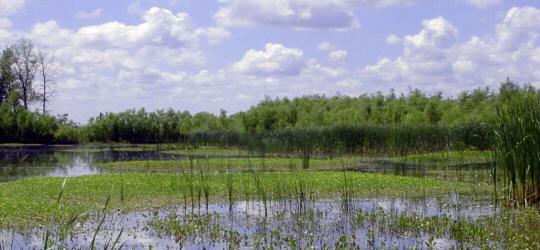Written by MCE Member and water policy expert, Charles Miller
It’s been eight months since the Supreme Court handed down its legally and scientifically baseless decision in Sackett v. EPA that gutted federal protections for wetlands. This radical decision has already wreaked havoc on wetlands jurisdiction, reducing federal authority over wetlands to levels not seen since the 1970s. The claims of its supporters that it would “clarify” federal jurisdiction have proven baseless, and it has even caused confusion and uncertainty at the state level, despite the fact the decision did not alter any state’s jurisdiction over water pollution. That is the silver lining to Sackett – states’ jurisdiction over water pollution remains (mostly) intact.
In most states, protections remain in place for wetlands and other water bodies that are crucial to the health of our rivers, streams, lakes, and drinking water. In Missouri, protections for wetlands, gaining and losing streams, ephemeral streams, and others remain in place at the state level. But even this saving grace has created problems for states trying to navigate the bewildering regulatory landscape that the Supreme Court and Justice Alito have created with their decision.
Not everyone appreciates this, however. In the aftermath of Sackett, representatives of some of Missouri’s biggest polluters tried to take advantage of this confusion. They appealed to our state’s Clean Water Commission, gleefully offering the specious interpretation that Sackett required the Commission to reduce Missouri’s jurisdiction over wetlands, ephemeral streams, and even hydrologically modified streams. Thankfully, after pushback from environmental groups, including Missouri Confluence Waterkeeper and Great Rivers Environmental Law Center, and a definitive statement from one of the Department of Natural Resources’ attorneys, Joel Reschly, these polluters appear to have abandoned their attacks on clean water through the state’s regulatory process.
Unfortunately, I don’t think this will be the end of big polluters and special interests’ attacks on our state’s authority to control water pollution. Despite the fact it removed clean water protections for most wetlands in the U.S., polluters and their high-priced lobbyists continue to grumble that the new, vastly reduced federal jurisdiction over wetlands is too expansive. In Missouri, it looks like regulatory attacks on clean water protections will be fruitless, but these powerful lobbyists can still attack DNR’s authority by lobbying the Missouri General Assembly. I anticipate that there will be a full-court press on legislators in 2024 to convince them that Missourians don’t really need protections for our wetlands and other protected waters. The only way to stop this is to stand up for these protections and let your legislators know that Missouri deserves clean water. You can look up your state elected officials on the Missouri Senate’s website.
Playing defense will not be enough to protect our right to swimmable, fishable, drinkable water, however. While the Department of Natural Resources has the authority to protect wetlands, they simply do not have the resources to ensure Missouri’s waters are fully protected. DNR lacks the legal authority to require “mitigation” of harms to wetlands. Mitigation simply means that when a developer, mining company, or other business destroys, fills, or otherwise harms a wetland, they have to invest money to restore nearby wetlands to compensate for the damage they have done.
DNR also needs more funding to ensure it can protect wetlands to the same extent that EPA and the U.S. Army Corps of Engineers did prior to Sackett. Right now, the department depends on citizens to report wetlands violations. The Department doesn’t have a dedicated “dredge and fill” permitting program to protect wetlands, and hasn’t even established water quality standards for wetlands.
All of this means that while the Department of Natural Resources has the authority to protect our wetlands, it doesn’t have the power to. While Sackett hasn’t changed the authority that states have to protect wetlands, its removal of federal jurisdiction has dealt a severe blow to the actual ability to protect wetlands. Because the Department of Natural Resources can only execute the laws that the Missouri Legislature has passed, it’s up to Missouri lawmakers to give DNR the tools it needs to protect our wetlands. Waterkeeper and our partners are looking for the Legislature to step up and provide DNR with the money it needs to adequately staff and manage a wetlands protection program in the state’s budget. We’re also hoping that legislators will fill the gaps in protections that Sackett has blown in the Clean Water Act, by giving DNR the authority to make developers repair damage they cause to wetland habitats, and to step up their enforcement ability in order to protect the hundreds of thousands of acres of wetlands that DNR is now responsible for protecting.
According to the Missouri Department of Conservation, 87% of the state’s wetlands have already been destroyed. Without these protections, corporate polluters will be able to run roughshod over Missouri’s wetlands, continuing to degrade habitat for game animals and fish, threaten drinking water quality, and profit from the loss of our state’s irreplaceable natural heritage.

